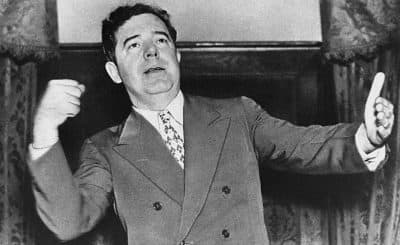Advertisement
What Happens After Trump?
Resume
This week on Freak Out And Carry On, Ron Suskind and Heather Cox Richardson talk with Norman Ornstein, contributing editor for The Atlantic and resident scholar at the American Enterprise Institute, on his new book "One Nation After Trump: A Guide for the Perplexed, the Disillusioned, the Desperate, and the Not-Yet Deported" co-authored by Thomas Mann and E.J. Dionne Jr. They look at the lasting effects the Trump presidency will have on the government and the country. They also discuss Republican Senator Bob Corker's recent criticism of the White House and the similarities between former Louisiana Governor and Senator Huey Long and Donald Trump.
Excerpts
Ron Suskind: This week we wanted to look at the long term damage President Trump may be causing our country, our government and our civic norms. A lot of people on both sides of the aisle are worried. It seems like more and more are coming forward. We've heard from Republican Senators Ben Sasse, John McCain, Jeff Flake--who was on this show. Trump's own Secretary of State, Rex Tillerson, refused to deny reports that he called the president a moron. At the center of all the attention right now is the retiring Republican Senator from Tennessee, Bob Corker. Last week the senator, who has been critical of the president in the past though he was an early and key supporter said, "I think Secretary Tillerson secretary Mattis and chief of staff Kelly are those people that help separate our country from chaos." Of course this puts a Twitter target on Corker's back and Trump is firing with impunity. Corker's criticism seems to be breaking through because he is warning that Trump is uniquely dangerous, perilous in ways we have not seen. Perhaps he just is unfit for the presidency. It makes me think that when President Trump leaves office--and yes at some point he will leave office--What kind of lasting harm will his presidency have done to the office itself and to our government and the nation beyond Washington?
Heather Cox Richardson: We are in a perilous time right now for sure. And there are so many balls in the air. And Americans are getting exhausted by that. But I have said and I believe that America right now is walking on a knife edge and it has been now for a while. This is not brand new. And it's a knife edge that could take us to the end of America or to the renewal of American democracy. We have been in a place in the past much like where we are now. We look very much like the 1850s, right before the Civil War, in the 1890s, during the gilded age, and in the 1920s, what were known as the roaring 20s. We had times when the country was bitterly divided when the government was run by people with a great deal of money. And in each of those moments we got the rise of a younger politician. In the 1850s it was Abraham Lincoln. In the 1890s it was Teddy Roosevelt, who was a Republican in the mold of Abraham Lincoln and who was horrified by the fact the Republican Party had been taken over by what were known as robber barons. In the 1920s it was Franklin Delano Roosevelt, a Democrat. And in each of those times Americans came right up to the brink of oligarchy or fascism and then they recovered their senses and they rebirth a new form of progressive American government that took us into new and exciting and productive and prosperous times. So right now we might be in the end times or the beginning times and maybe they're both the same thing.
Norm Ornstein: I'm at an age where I can be blunt. I think it's been clear for some time, whether it is a clinical diagnosis or not, that Donald Trump is a 71 year old lifelong narcissistic sociopath. I would say as an aside it's a reflection of our times, and not a very positive one, that Corker's colleagues are not doing much to support him publicly. They're basically putting the need for tax cuts for the rich ahead of the danger that he poses. I believe fundamentally that 95% of the Republicans in Congress, if they could snap their fingers and have Donald Trump simply disappear and make Mike Pence president without any adverse effects on them, they would do it in a nanosecond. But they are scared to death of that base. To go after Trump means that you are going to alienate a significant portion of your own party base. But it also means you are going to be taking on not just President Trump but the Mercers and other billionaires, Sean Hannity, Tucker Carlson and the army of right wing tribal media who will stick with Trump and attack the others.
Heather Cox Richardson: Can you give us a little bit of insight on the extraordinary damage that this Trump presidency has done to our State Department, to our regulatory agencies, to all the different parts of the American government? Is there in fact a way back?
Norm Ornstein: Yeah there is a way back. But I think we have to recognize that the damage that we're seeing done is not going away for a very substantial period of time. You know some of the actions that are being taken on the health care front, on the environmental front, the damage to the norms in many government agencies, the hollowing out of the diplomatic corps, combined with the attempts in places like EPA and Interior and many other departments to drive out some of the most senior managers. These things are not going to be restored in the short run. We're digging a hole here that's going to be a deep one. The big question is will the walls collapse around all of us? Or are we going to be able to reconstruct them and move back the way we have in the past?
Heather Cox Richardson: We certainly we were as deeply divided in the 1850s, maybe even more so. People were shooting each other in Congress. And in the 1890s as well. People were in the streets--23,000 strikes between 1880 and 1890.

Norm Ornstein: I would argue that if Huey Long hadn't been shot in the 1930s he might well have emerged as a populist on the left, on the Democratic side who could have given Roosevelt the fits. In the 1930s, in the Depression, we had so many countries--Germany, Italy and others--that turned to fascism. And we think that we were immune from that but we had forces on the right, with Father Coughlin, and on the left, with Huey Long, taking some of the same themes that we saw with Donald Trump. For Huey Long it really was the working people against the elites. He was a very dangerous man who was assassinated on the steps of the Louisiana Capitol but who had a significant amount of popularity around the time, when we had 25 percent or more unemployment.
Ron Suskind: Huey Long's my nominee for the person who in disposition seems most Trump-like. He was great with a slogan, basically saying "Make America great again." And there's the question of his deep and profound corruption. But he had real appeal as a Trump-like character. He did not become president. But a few twists and turns along the way he might have been.
The views and opinions expressed in this podcast are solely those of the participants and do not in any way reflect the views of WBUR management or its employees.
